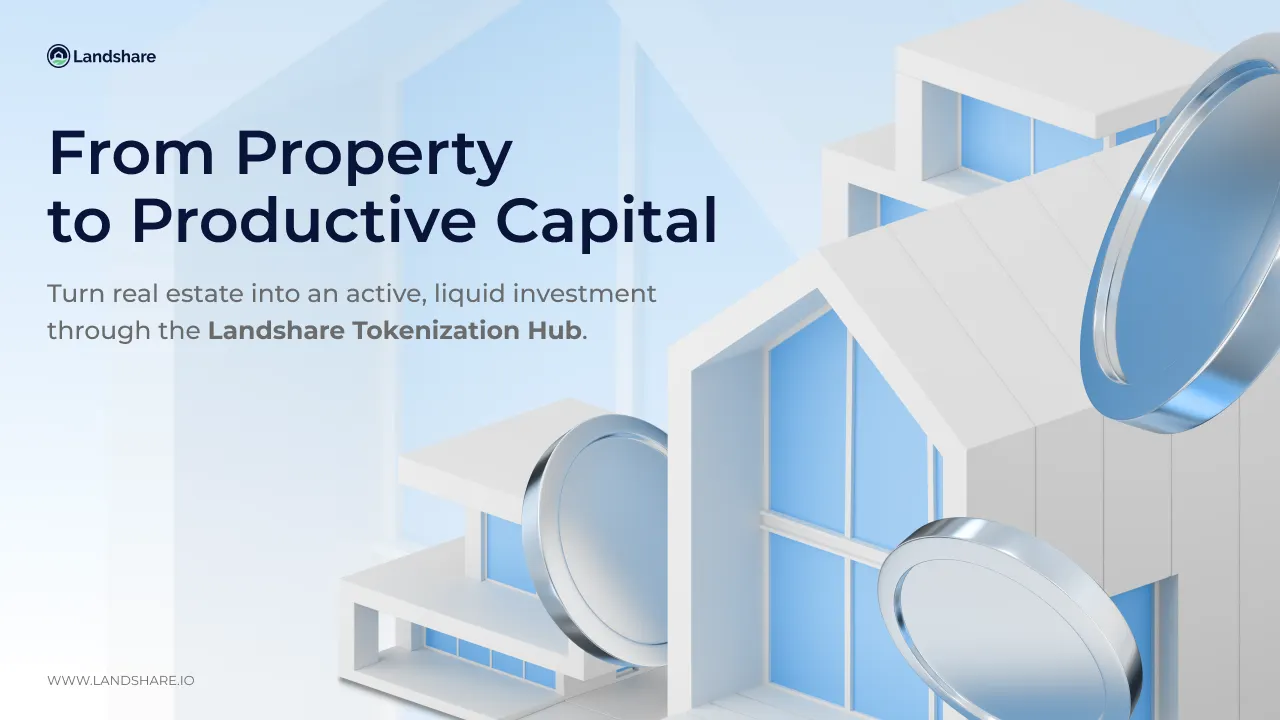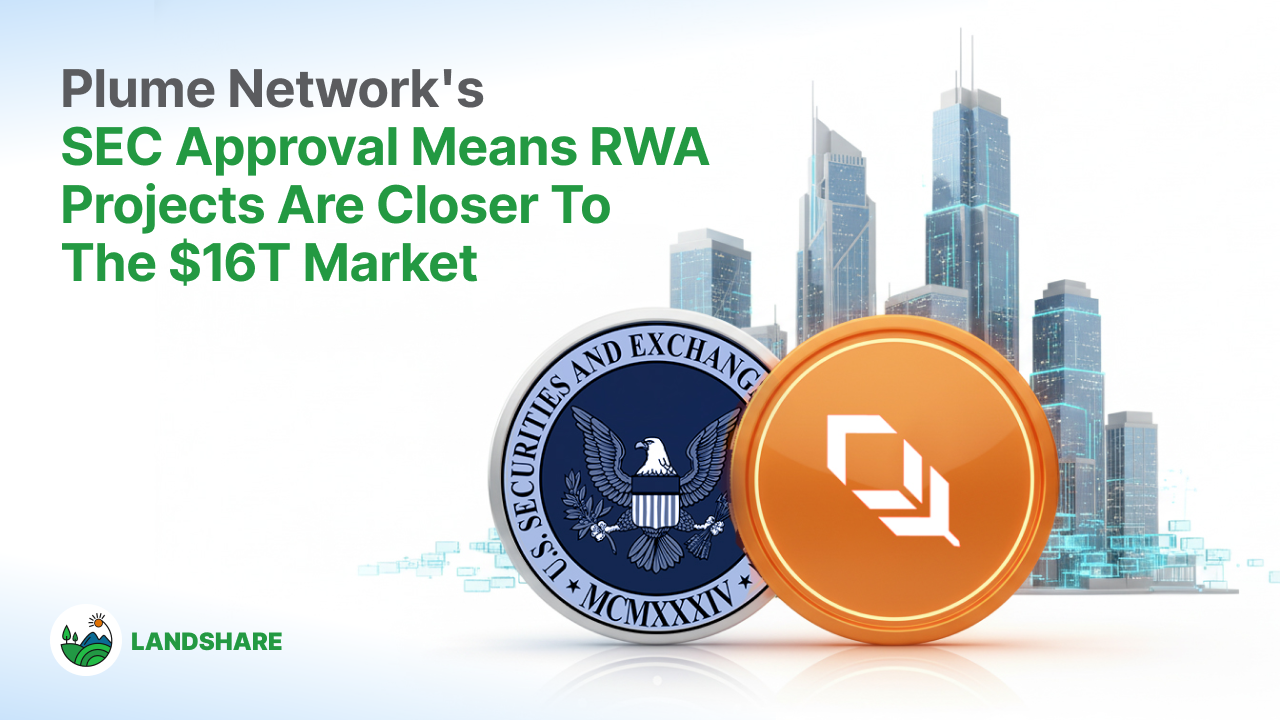How Investors and Property Owners Reap the Benefits of Tokenization
Landshare Team

The real estate market is witnessing a transformative shift with the introduction of blockchain technology, particularly through the concept of tokenization. This innovative approach is redefining property ownership, offering new opportunities for investment and liquidity.
If you are an investor in real estate, you might have reaped the benefits of tokenized real estate investments. However, real estate tokenization not only opens a new avenue for real estate investors but also brings forth advantages to property owners.
Tokenization allows property owners to convert real estate assets into digital tokens, thereby simplifying transactions and broadening investor access. Liquidity and fractionalization are key benefits in tokenized real estate but for property owners within the ecosystem could see more than this.
In the following blog, let's explore more compelling use cases of tokenization for property owners including house flipping, partial sales, and tokenizing cash flows, backed by real statistics and figures to illustrate its growing impact.
What Benefits Real Estate Tokenization Bring?
Tokenization is a process of creating a digital identity of a tangible financial asset on blockchain which is unique and anonymous. This method takes the value of an asset on a chain. It brings benefits such as fractional ownership, liquidity, enhanced security and transparency. Currencies, commodities, real estate properties and art pieces are the common tokenized assets.
As an investor, you can enjoy investing in multiple assets through fractional ownership reaping the benefits of varied returns on respective assets. Real estate sector is traditionally one of the most illiquid ones since it takes time to sell off a property which requires time and effort but tokenization solves such pain points.

We have already discussed the pros and cons of tokenized real estate investments in earlier pieces. Along with the investors, tokenization resolves issues for property owners. The tokenized real estate properties can be sold off in units that increase higher chances of sale. Following are more crucial advantages of tokenized real estate for property owners.
House Flipping
Traditionally the practice of purchasing properties, renovating them and then selling them in profit is house flipping. It needs a hefty amount upfront and since the market turns or unexpected costs are also crucial factors, there are risks included in the process. But inclusion of tokenization could mitigate these risks to some extent also resolving issues related to liquidity.
The house flippers could sell fractional shares of the property as tokens in exchange for the required amount. Let’s say a flipper buys a property for $300,000 and needs $50,000 for renovations. Now they could issue 350,000 tokens valued at $1 each to raise the renovation funds. This way they can not only speed up the process but also manage to diversify the risk.
Partial Sales
Tokenization also allows partial sales that enable property owners selling a fraction of their property to different investors. Though the method could be useful for any real estate property, the markets with high-value properties such as the United States can benefit the most. This way the property owners bear no debt and it becomes a great alternative to home equity line of credit (HELOC).
Property owners can sell out their shares of property to a pool of investors after tokenizing it. For instance, a property owner takes 60% ownership and sells the rest 40% of the property. Along with the democratization of real estate investment, this approach also provides liquidity to owners to invest in more ventures or even make improvements in the real estate property.
Tokenizing Cash Flow
One of the innovative ways to secure the funding along with providing regular income to investors is through tokenization of rental properties’ cash flows. You as an owner of a real estate property that generates $10,000 per month through rent could use the method and tokenize this case flow while offering tokens that represent a share in the rental income. This method attracts investors seeking stable returns without the need for large capital investments.
A Deloitte report states that by offering such fractional ownership and investment opportunities, tokenization could grow the liquidity of global real estate assets by over $1.4 trillion.
Benefits of Third-Party Tokenization with Landshare
At Landshare, we've dedicated ourselves to democratizing real estate investment, and our efforts have culminated in the Landshare RWA Token. This innovative product empowers anyone to generate passive income from real-world assets with an investment as low as $1.
The benefits of our tokenization process extend beyond just investors. Property owners—whether individuals, corporate entities, investment clubs, or funds—now have a powerful tool at their disposal. Through tokenization, both investors and property owners can cultivate a relationship that is mutually advantageous.
As we build on our strong base of RWA investors, our next objective is to enable property owners to tokenize their assets through the Landshare platform. This capability will allow them to raise funds and secure loans against their properties, enhancing the value provided to our existing LSRWA investors.
Tokenization offers property owners a range of strategic advantages. It isn't merely about listing properties for sale. Its true value lies in its ability to provide liquidity and allow for the fractional ownership of properties. Alternatively, they can borrow against the future cash flow from their properties, maintaining their stake while obtaining upfront cash.
Landshare has always been taking bold and unique steps for the sake of community and is now looking to include property owners, who remain at the other end of spectrum, along with the investors.
This initiative is set to broaden the array of properties available on our platform, diversify our offerings with new property types including vacation homes and commercial spaces, and expand our reach beyond the U.S. It also introduces new mintable NFTs, enriching our investors' options.
The Broader Impact and Future Outlook
The broader impact of real estate tokenization is significant, offering increased liquidity, reduced transaction costs, and enhanced market efficiency. A study by the World Economic Forum predicts that by 2027, 10% of the global GDP will be stored on blockchain technology, with real estate being a major component of this shift.
This adoption indicates a robust future where tokenization not only makes real estate investment more accessible but also more integrated with global financial markets, allowing for seamless international transactions and diversified portfolios.
Tokenization stands out as a revolutionary tool in real estate, providing property owners and investors with novel ways to manage and profit from their assets. As the technology matures and regulatory frameworks develop, the possibilities for tokenization in real estate will likely expand, further unlocking the potential of properties as both investment vehicles and sources of revenue.
About Landshare
Landshare is a platform for tokenizing property in the United States. It allows investors to buy shares in residential properties through blockchain tokens. This method has simplified the investment process and made real estate investment accessible to a broader audience. Landshare merges blockchain technology with the real estate sector by offering tokenized real estate assets on its platform, enabling investments as low as $1 and democratizing access to property investment.
The platform utilizes Real World Asset (LSRWA) tokens to offer investors shared ownership in actual property assets, which is a significant innovation in real estate investment. Landshare's utility token, LAND, has proven its transactional efficiency with the successful sale of four tokenized properties on the Binance Smart Chain (BSC), showcasing its market readiness. By addressing inefficiencies and liquidity challenges in traditional real estate, Landshare is emerging as a pivotal player, providing attractive opportunities for growth and passive income.
Landshare October Recap
Landshare Team
October was a milestone month for Landshare – one that set the stage for the next era of on-chain real estate. From the official Landshare v2 announcement to new ecosystem updates, governance decisions, and exciting community initiatives, we’ve laid the groundwork for a future defined by growth, utility, and innovation.
This month, we introduced the framework that will redefine how investors, property owners, and DeFi users interact with real estate on-chain. Let’s recap the highlights 👇
Landshare v2 Announcement
The official unveiling of Landshare v2 signaled the start of a new chapter – one built around real utility, real yield, and real scalability.
Landshare v2 isn’t just an upgrade. It’s the foundation of a self-sustaining ecosystem where tokenized real estate finally reaches its full potential. The new system transforms stable assets into active yield-generating opportunities, seamlessly connecting traditional markets to DeFi.
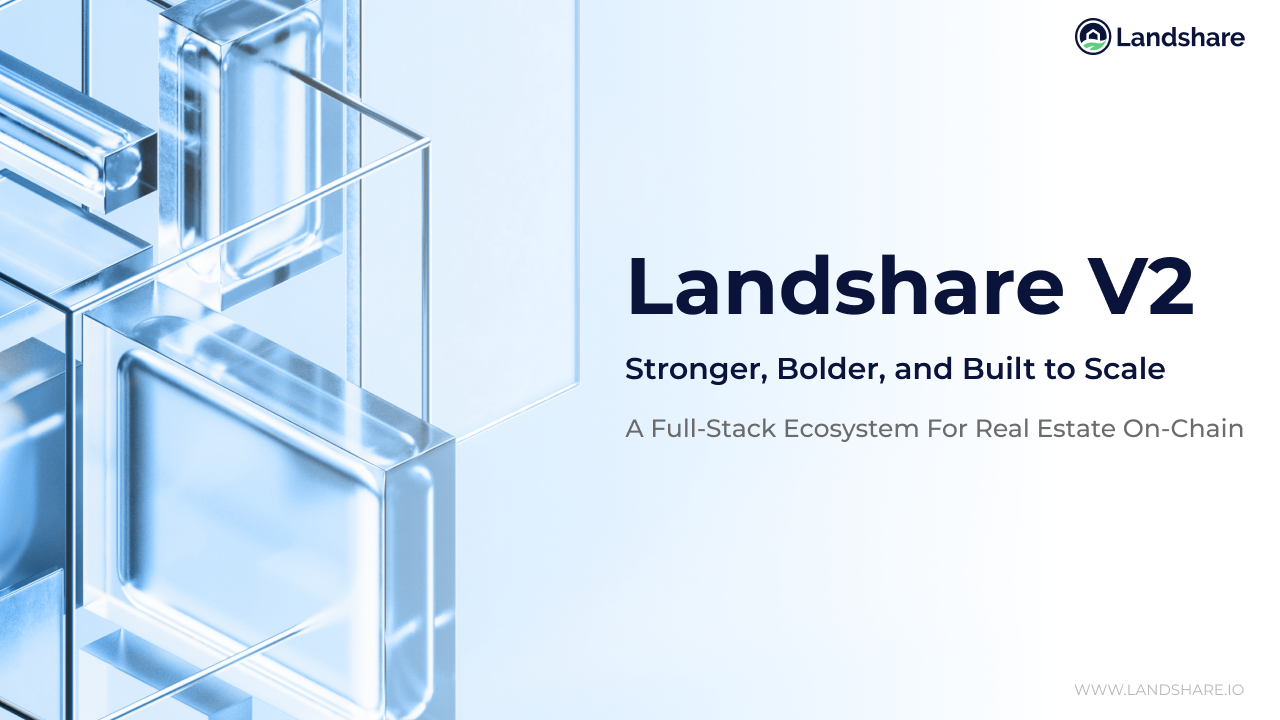
The Three Pillars of Landshare v2
In our follow-up deep dive, we explored the three core pillars that form the foundation of Landshare v2:
- The Real Asset Vault (RAV): A seamless gateway for stablecoin holders to earn real yield backed by tokenized properties.
- The Tokenization Hub: A complete solution for property owners to bring their assets on-chain.
- The DeFi Suite: Tools and incentives that amplify participation and utility across the ecosystem.
Together, these pillars create a self-sustaining growth loop, where every user and property strengthens the entire network.
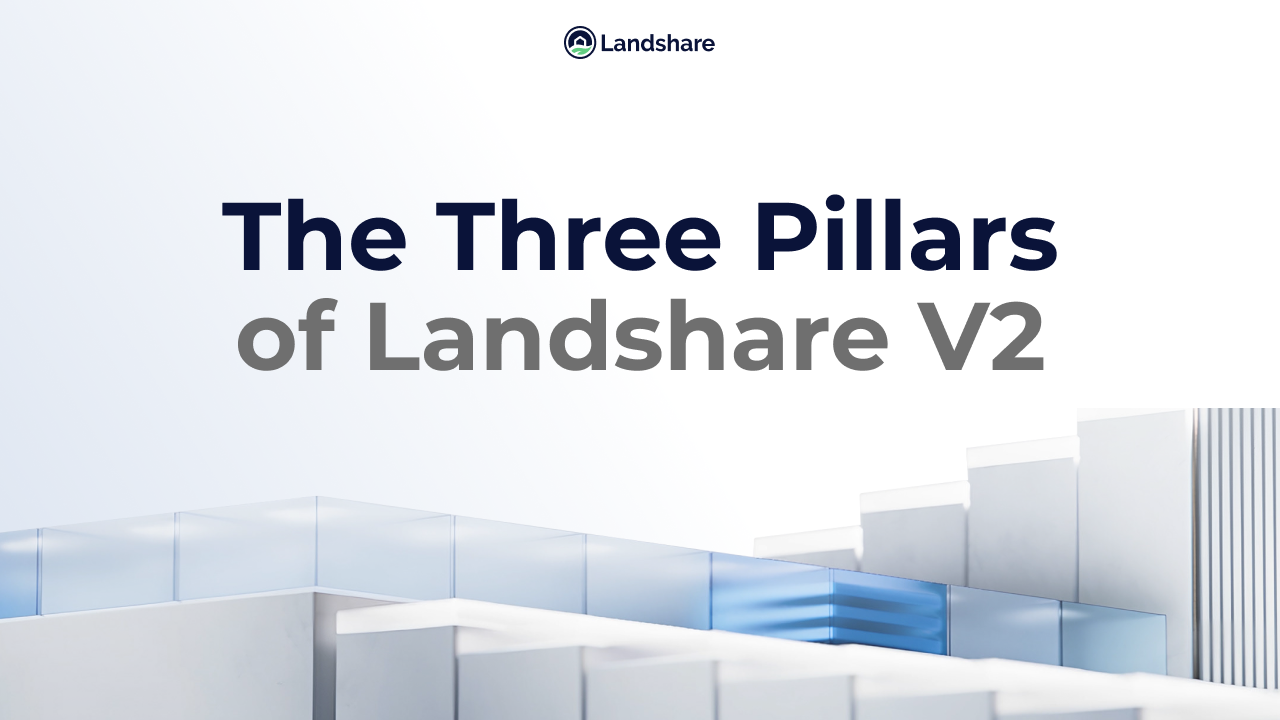
DAO Proposal Passed
In late October, the community voted to reduce LP emissions by 50% across both the LAND–BNB and LSRWA–USDT pools – with the proposal passing at 62.28% in favor.
This important step helps:
✅ Reduce daily LAND inflation
✅ Strengthen token scarcity and price stability
✅ Extend the reward pool lifespan
✅ Encourage long-term liquidity participation
The change will take effect within 48 hours of approval and marks another move toward a more balanced, sustainable economy for Landshare v2.
🗳️ View the full proposal and results
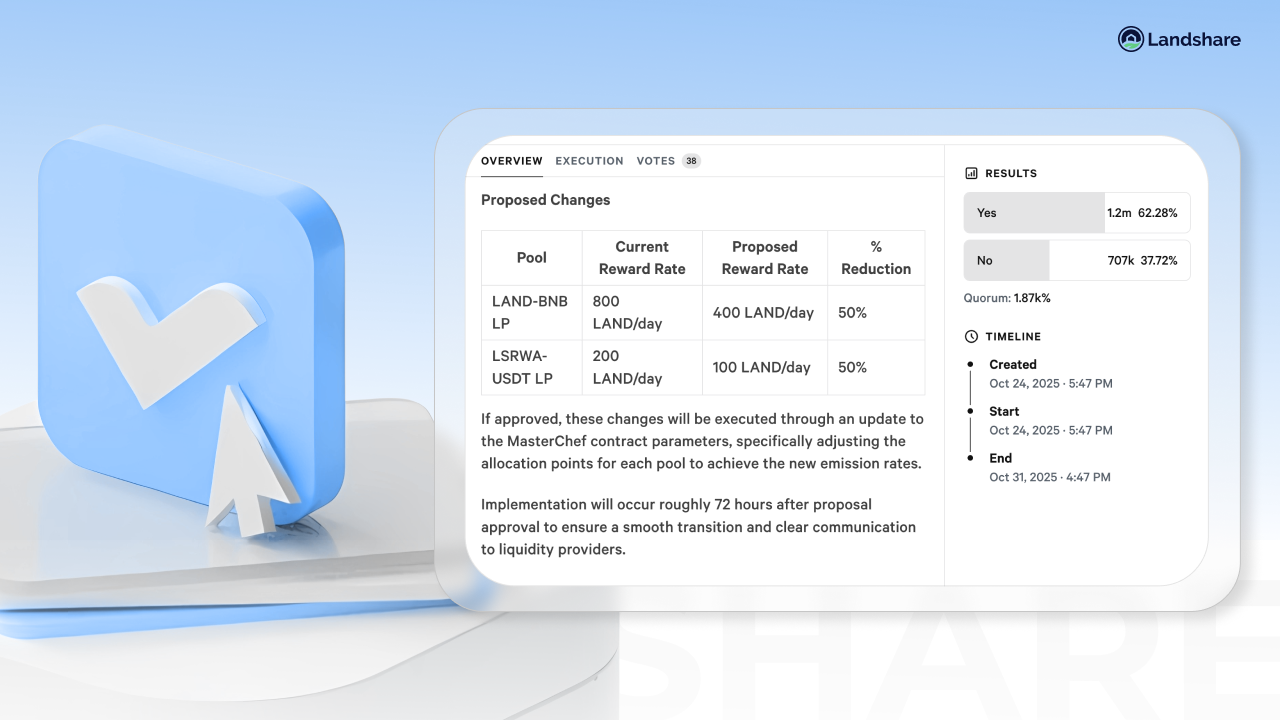
Tokenization Hub Breakdown
We released a comprehensive guide to the Landshare Tokenization Hub, explaining how property owners can now go beyond simple tokenization to access real investors, liquidity, and on-chain utility.
The Hub bridges traditional real estate with blockchain finance – creating a pathway for real-world assets to generate ongoing yield, transparency, and accessibility.

4.5M+ LAND Staked
October also marked another key milestone – over 4.5 million LAND tokens (nearly half of the total supply) are now staked in vaults. This incredible community achievement reflects growing confidence in Landshare’s long-term vision and token utility.
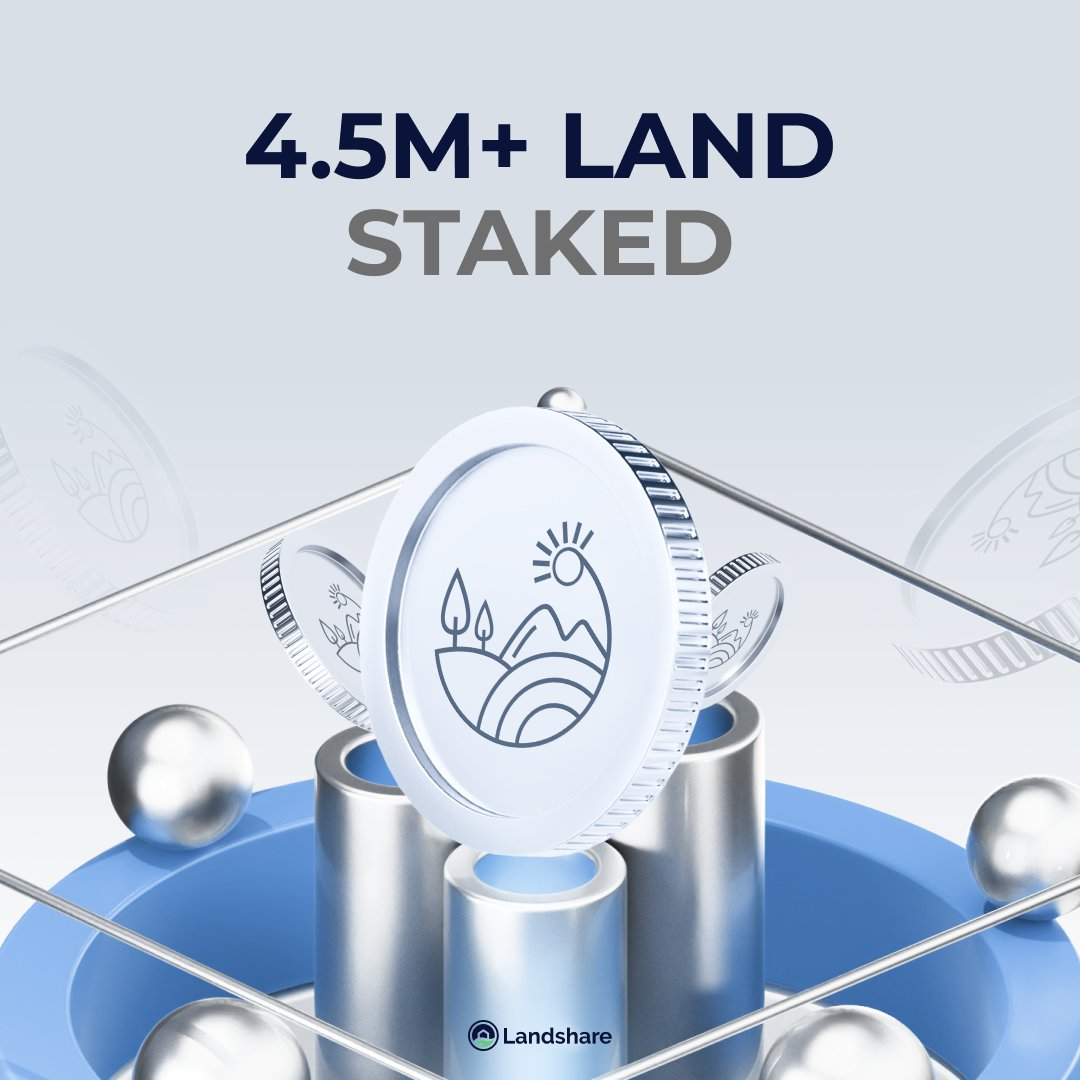
Community Townhall Incoming
We’re excited to announce our next Community Townhall, happening Thursday, November 6 at 12 PM CST or 6 PM CET on X Spaces!
Join Jordan (CEO), Travis (Co-Founder), and Ivan (CMO) as they discuss everything happening with Landshare v2, recent DAO proposals, and take your questions live.
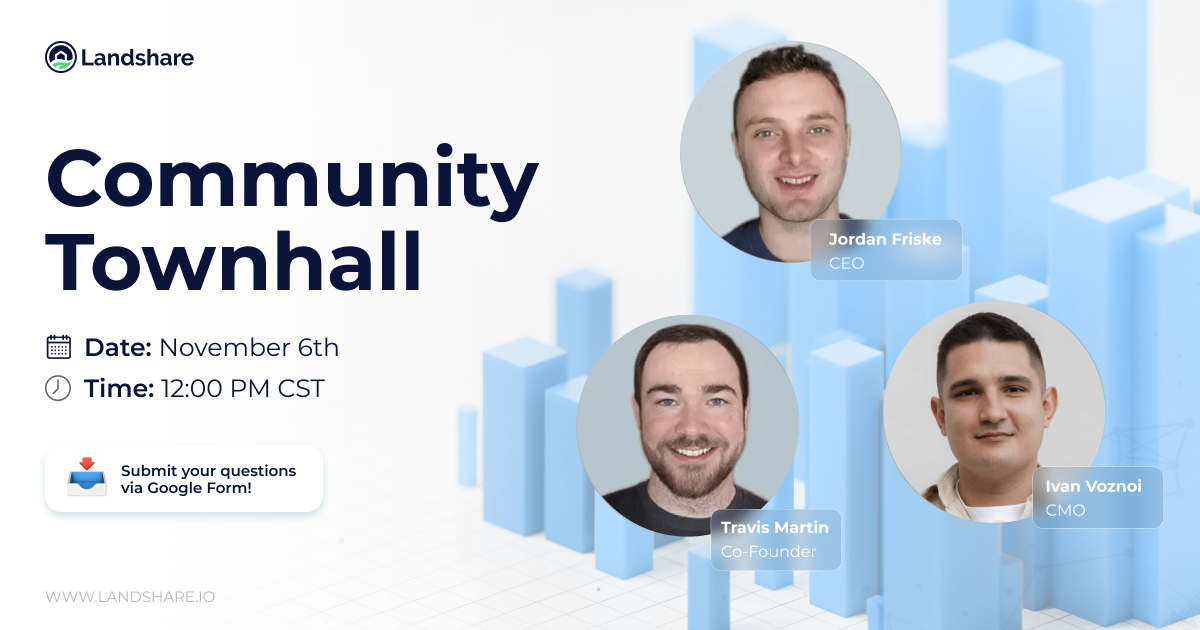
Looking Ahead
With Landshare v2 on the horizon, the foundation is set for a new phase of growth and adoption. In the coming weeks, we’ll be sharing more details on the RAV launch, the Points Campaign, and other major milestones driving our ecosystem forward.
Stay tuned – the future of real estate is being built on-chain, and we’re just getting started.
Tokenization Hub Breakdown
Landshare Team
Real estate tokenization has been a buzzword for years. Yet in practice, most projects have failed to move beyond press releases and empty promises. Too often, blockchain has been used as a veneer to package illiquid or low-quality assets, leaving investors with tokens that serve little purpose and property owners with no meaningful results.
Without investors, liquidity, or secondary markets, tokenization becomes little more than an on-chain spreadsheet — a digital record of ownership that no one can trade or invest in. For property owners, that means time and money spent “tokenizing” without achieving key goals: raising capital, expanding visibility, or unlocking value.
A Smarter Path Forward
For real estate tokenization to truly work, it needs to deliver tangible investment outcomes. After years of building and refining on-chain real estate products, Landshare has developed a model designed to do exactly that.
The Landshare Tokenization Hub transforms tokenization from a passive concept into an active investment process — connecting high-quality properties with real investors, liquidity pathways, and a live blockchain economy.
The Tokenization Hub Solution
Most platforms stop once a token is created. Landshare’s Tokenization Hub goes further , offering a complete pathway for property owners to bring their assets on-chain and immediately engage investors.
Each project is structured for success from day one, with:
- Customized tokenization models tailored to each property
- Transparent fundraising mechanics with defined soft and hard caps
- Built-in integration with the broader Landshare ecosystem
By connecting directly to Landshare’s existing network of investors and DeFi infrastructure, offerings can attract participation as soon as they launch. Once a fundraising goal is met, property tokens are deposited into the Landshare RWA Pool, linking them to ongoing liquidity, yield mechanisms, and secondary market exposure.
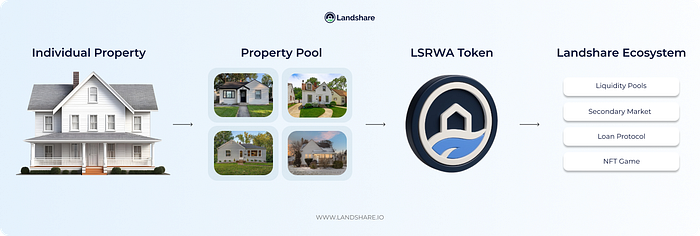
Why This Model Delivers Real Results
Where others leave property owners to manage marketing, compliance, and liquidity alone, the Tokenization Hub handles these as part of a unified process. This integration dramatically increases the likelihood of meeting fundraising goals and sustaining long-term engagement.
Integration with the Landshare RWA Token (LSRWA) is central to this model. Rather than isolated tokens with no market, each property becomes part of a shared, liquid environment that generates yield and investor participation. Individual assets can still be represented, extracted, or traded independently when needed.
For example, a multifamily property owner might tokenize 20% equity to raise $500,000 on-chain, connect the asset to the RWA Pool for ongoing yield, and maintain full transparency for investors — all within a compliant, accessible framework.
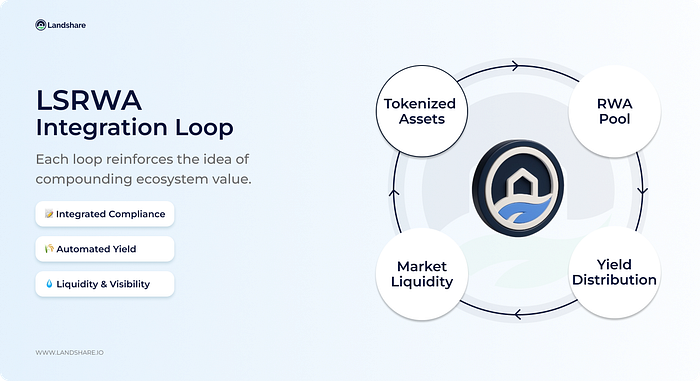
How It Works
- Tokenize the Property: Landshare collaborates with property owners to create a digital representation of equity, income rights, or hybrid participation.
- Launch the Offering: The property is listed on the Tokenization Hub with defined terms, caps, and transparent investor access.
- Fundraising & Validation: Investors participate directly on-chain. Once the soft cap is reached, funds are secured and the offering is finalized.
- Ecosystem Integration: Tokens are deposited into the Landshare RWA Pool, and investors receive LSRWA tokens representing pooled value and yield potential.
- Ongoing Value Creation: Property owners gain lasting benefits through liquidity, visibility, and investor engagement. As new assets are added to the pool, owners can rebalance between equity and cash, making real estate a more dynamic and liquid asset than ever before.

Built for Real-World Impact
The Landshare Tokenization Hub is more than a technical service — it’s a complete ecosystem designed to make real estate investment active, liquid, and accessible.
For property owners, it offers a streamlined way to raise capital and connect with global investors.
For investors, it provides exposure to yield-generating, on-chain assets backed by transparent real-world value.
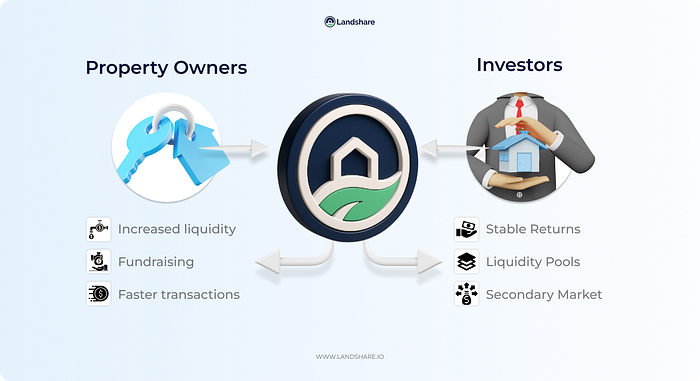
In an industry crowded with static tokens and overhyped promises, the Tokenization Hub delivers what tokenization was always meant to achieve — real outcomes, real liquidity, and real-world results.
🏡 About Landshare
Landshare is a tokenized real estate ecosystem that enables seamless investment in real-world assets on the blockchain. With Landshare, you can own a share of a real-world property simply by holding our RWA Tokens ($LSRWA). Our platform offers a secure, transparent, and efficient way to invest in real estate without traditional barriers.
- Website: landshare.io
- Twitter: @Landshareio
- Community: t.me/landshare
Plume Network's SEC Approval Means RWA Projects Are Closer to the $16T Market
Landshare Team
On October 6, Plume Network announced on its social media that it had been approved to be an SEC-registered transfer agent. This is a big milestone for the RWA industry, signaling that the traditional financial system is welcoming tokenized assets.
Transfer agents basically manage important back-end work and are the official record-keepers for securities issuers. So, essentially, they maintain shareholder registries, record ownership changes, issue certificates, and handle other corporate actions.
Plume’s approval means these critical functions can now be managed on-chain for tokenized securities. This is a pretty big deal, as it gives Plume and its users formal regulatory standing under U.S. law for on-chain securities.
Experts believe that this approval can boost the global RWA market, and top players like Landshare can benefit from it due to the increased regulatory clarity.
Why is the SEC’s Approval Important for Plume Network?
So, first, understand the roles of a registered transfer agent to get a better understanding of its importance.
In traditional finance, a transfer agent is usually a company or bank that tracks who owns a company’s securities and facilitates trades. They ensure every share transfer, stock split, or dividend payment is accurately recorded and reported. Now, let’s understand how this traditional role will work in the world of blockchain.
Post Link
By replicating these roles on-chain, Plume’s platform can securely log every token sale or dividend distribution in an immutable ledger, while also syncing with regulators. As Plume explains, its transfer-agent protocol will “link cap tables and reporting directly to SEC and DTCC systems”.
This means tokenized equity and debt on Plume can behave like traditional securities, but will be managed better with the help of blockchain technology.
Plume’s CEO believes that this regulation “exists to protect investors’ rights as shareholders,” and Plume’s on-chain solution is meant to simplify the processes under that framework.
Its Impact:
Experts believe that the registration will open up several doors for the RWA market because of the ‘trust factor’. Being registered means there are no risks as far as legality is concerned. When an industry or its top player receives a green flag from the government regulatory agencies, institutional capital follows.
BlackRock, Fidelity, JP Morgan, etc., are already looking to build blockchain-based products. This will further invite them to join the RWA growth story and possibly super-boost it.
Moreover, another important benefit is that tokenized securities can now flow through compliance obstacles. This means issuance times can be cut from months to weeks with the help of smart contracts. Similarly, on-chain dividends and ICOs can enjoy the same legal protections as Wall Street offerings.
What Does This Mean For The RWA Market?
Plume’s win comes at a time when analysts are already forecasting a massive growth in tokenized RWAs over the next decade. Institutions now value tokenization as a way to digitize everything from private credit to real estate. Also, the numbers are pretty optimistic as well.
A Boston Consulting Group report estimated the global asset-tokenization market could reach about $16.1 trillion by 2030. The industry has already grown by almost 380% in the past three years. To put things into perspective, today’s entire crypto market cap is smaller than those figures. Even some of the more conservative forecasts still show multi-trillion growth.
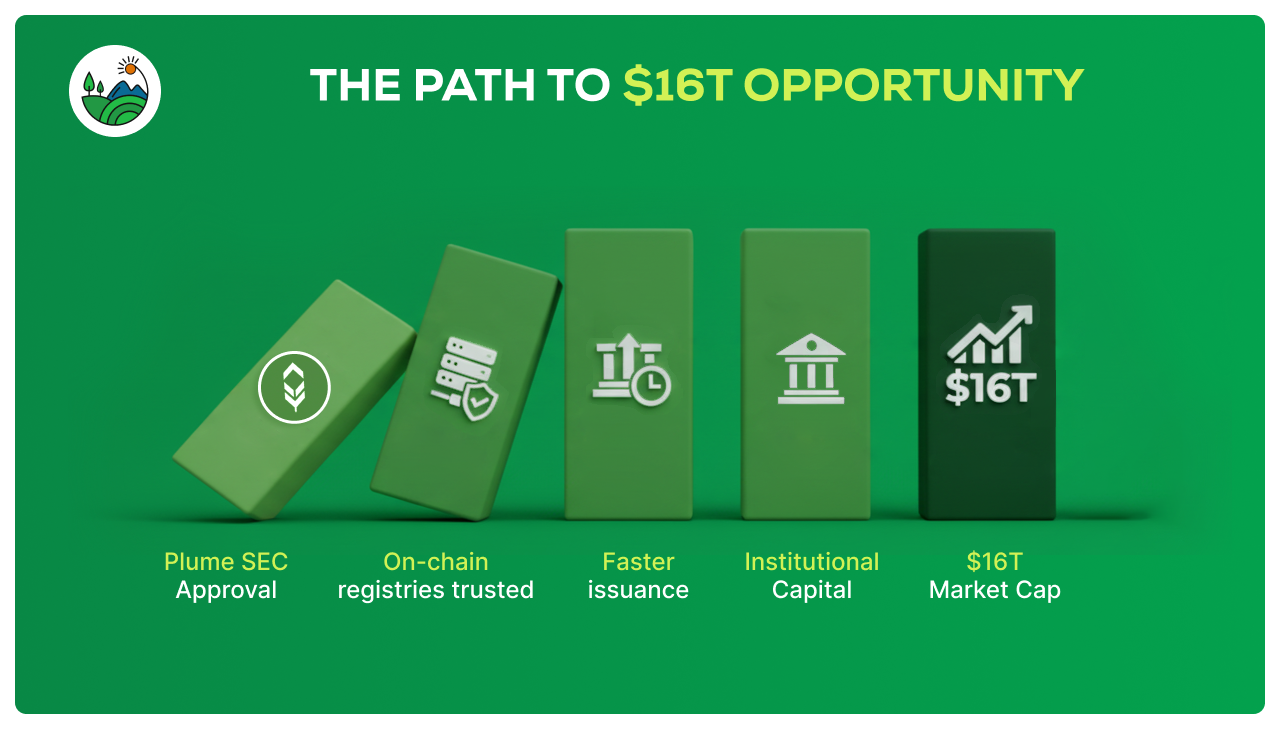
If these estimates can materialize in the days to come, RWA is well-positioned to be one of the largest markets in the world of modern finance.
Moreover, the external conditions are favoring this industry. Governments and regulators worldwide are creating proper frameworks. For instance, Asia-Pacific markets are running pilots for digital bonds and crafting standardized rules for security tokens.
These developments and the excitement of retail investors in this category build confidence that the $16T opportunity is actually very real.
How Will Landshare Benefit From This?
Landshare stands at the forefront of benefiting from this opportunity because of its early entry and real-world utility. This is very important as institutions seek new projects that have use cases that can help them capture a considerable market share.
Moreover, Landshare already operates as a compliant RWA platform. For instance, each Landshare RWA Token (LSRWA) is a security token representing fractional shares of a U.S. real estate portfolio, and buyers must pass KYC/AML checks.
The fact that regulators are now approving on-chain transfer agents shows the industry’s efforts are finally paying off. Here are some more factors that can help Landshare be one of the top RWA contenders:
1. Regulatory Credibility: Plume’s SEC status essentially means that tokenized securities can operate within established rules. Landshare’s approach aligns with these principles. So, investors can be assured that their projects sit within a legal framework designed to protect shareholders.
2. Investor Confidence: Every step toward clear regulation lifts confidence. The recently passed GENIUS Act, the SEC’s staff statements on liquid-staking, and the Trump administration’s overall outlook towards the crypto market have been fairly positive.
Similarly, Plume being approved as a SEC-registered blockchain transfer agent tells retail and institutional investors that projects like Landshare aren’t mere experiments. They’re rather a part of a regulated financial evolution.
Moreover, it means regulators see value in on-chain tokens, and that kind of signal helps legitimize the space Landshare operates in.
3. Landshare’s Own Progress: Landshare isn’t about hype. It is rather focused on delivering value from day one. The project has already sold four houses on the BNB chain. It is also providing consistent rental returns to the investors in its properties.
Moreover, the team remains focused on delivering stable, compliant returns from real estate growth.
Conclusion
So, now we know that the recent news was about more than just Plume Network being approved by the SEC to be a transfer agent. It rather has a much bigger impact on the RWA market as a whole.
While the industry continues to grow, for Landshare, it is the right time to innovate further and add more value to consumers’ lives.






